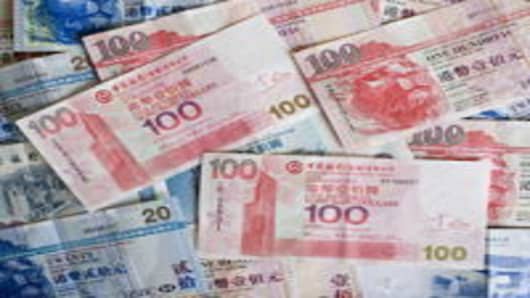But by forcing Hong Kong to import ultra-loose monetary policy from the U.S., the peg is contributing to soaring inflation and property prices, a growing source of concern among city dwellers.
Stuart Gulliver, chief executive of HSBC, Hong Kong’s biggest bank and one of the three lenders licensed to print local bank notes, caused something of a stir last month when he questioned the peg, even though he stopped short of suggesting it should be broken any time soon.
“If Hong Kong was to review the Hong Kong dollar peg… [it] would be better to be revised to some kind of managed float with a basket of currencies that reflect the trading partners of Hong Kong, rather than choosing either a complete free float or to peg it to another currency,” Mr Gulliver said at an HSBC news conference.
Mr Gulliver’s comments triggered a sharp response from Norman Chan, head of the Hong Kong Monetary Authority, who published a 1,700-word defense of the peg on the de facto central bank’s website.
“We must recognize that there is no one-size-fits-all exchange rate regime,” Mr Chan said. “All options, including linking the Hong Kong dollar to the U.S. dollar or a basket of currencies, or even letting the Hong Kong dollar float freely, have their own pros and cons.”
However, Mr Chan continued, remaining pegged to the currency at the heart of the global monetary system remains the best option for Hong Kong and the government has “no intention” of changing things.
The big disadvantage of Hong Kong’s exchange rate mechanism is that it forces local interest rates to follow those in the U.S. — even when the local economy is completely out of sync with the American one. With the U.S. teetering on the brink of recession, the Federal Reserve has vowed to keep short-term interest rates close to zero until mid-2013.
In stark contrast, Hong Kong is booming thanks to above-8 per cent economic growth on the Chinese mainland.
Ultra-low interest rates in a strong economy is a recipe for overheating. Hong Kong property prices have jumped almost 70 percent since the start of 2009. The consumer price index for July rose 7.9 percent from a year earlier, the fastest pace of inflation since 1995.
Yet, despite these side-effects, there is little evidence that anything would serve Hong Kong better than its peg to the U.S. dollar. Allowing the Hong Kong dollar to float freely would let policymakers control interest rates to curb domestic inflation.
Yet, as a small, open economy vulnerable to large capital flows and with heavy reliance on external trade, floating its currency would expose Hong Kong to destabilizing foreign exchange volatility.
Pegging the Hong Kong dollar to the Chinese renminbi is another non-starter — only if the renminbi became a convertible currency would this be viable.
There is no sign that China will dismantle its capital account controls any time soon. That leaves the possibility of pegging the Hong Kong dollar to a basket of currencies, as proposed by Mr Gulliver.
John Greenwood, the architect of Hong Kong’s exchange rate mechanism and now chief economist at Invesco, is unconvinced. “If you look around the world, it’s very hard to see what they would use,” he says.
“For all the major currencies, whether it is the U.S. dollar, the euro, pound sterling or the Swiss franc, interest rates are very, very low and would not act as a restraint on bank lending or appetite for credit in Hong Kong,” he says.
“So diversifying from a single currency to a basket in the current situation isn’t going to change things.”
Perhaps the best reason for sticking with the status quo is simply that the current exchange rate mechanism has worked for so long, even surviving a speculative attack by George Soros and his flagship Quantum Fund during the 1998 Asian financial crisis.
Nearly three decades of survival has given Hong Kong’s exchange rate mechanism great credibility in the eyes of the public and the markets.
Like their counterparts in Switzerland, Hong Kong officials are mindful of the risks of showing any lack of commitment to the peg.


